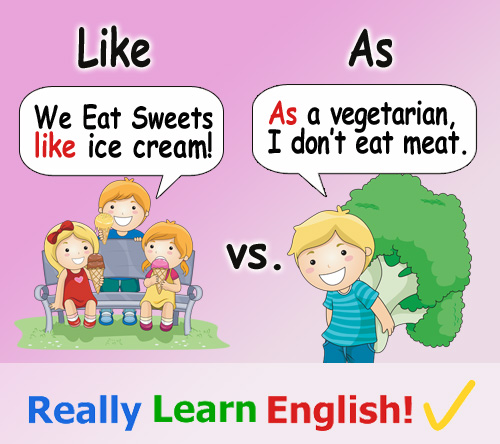Like vs. As
What is the difference?
Many students of English have trouble knowing when to use like and when to use as. What is the difference between these two words?
The rule about like and as has several different parts. That's why like and as can be difficult for students to use properly. Understanding the rule is absolutely essential, because if you mix up the words it's considered quite a big mistake. Most of the time, anyway.
Technically, like and as are not interchangeable. This means that in some situations you have to use one, and in some situations you need to use the other. However, there is one part of the rule that is often broken by native English speakers when they talk. How confusing!

Click Here for Step-by-Step Rules, Stories and Exercises to Practice All English Tenses
Like
Like, of course, is normally a verb that means to enjoy. However, this is not the part of the rule that students find difficult!
In addition to its use as a verb, grammatically, the word like can be a preposition. This means it is a word that connects two nouns. Like means that two things are similar. For example, we can say, "Kelly is like her mother" and "American football is like rugby".
The first sentence means that Kelly and her mother are similar, while the second sentence means that American football is similar to rugby. The word likewise comes from this definition of like. Likewise is an adverb that means in the same way.
We can modify like with words such as"very,""just," "extremely,""quite" and other adverbs of degree if we want to be more specific. The sentence"Kelly is just like her mother" means that Kelly is extremely similar to her mother. It is also common to use like in collocations such as look like, sound like, feel like, smell like and seem like. These expressions mean look similar to, sound similar to, feel similar to, etc.
Now let's move on to the next part of the rule.
Like is also used to introduce examples. We say,"Spain is famous for foods like paella, tapas and ham" because paella, tapas and ham are examples of famous Spanish foods. Students sometimes make sentences such as, "Spain is famous for foods as paella, tapas and ham," but this is incorrect.
However, when we use like to introduce examples it is also possible to use such as. So, we can make the sentence,"Spain is famous for foods such as paella, tapas and ham" and it means the same as using like.
Examples:
- The weather in Madrid is like that in New York.
(The weather in New York and Madrid are similar.)


- He looks like his sister.
(He and his sister look similar to each other.)

- Did you hear that? It sounded like a knock at the door.
(Did someone knock? I thought I heard a noise similar to knocking.)

- What are you cooking? It smells like chicken.
(The food you are cooking smells similar to chicken.)

- Children tend to enjoy sweets like ice cream and cakes.
(Ice cream and cakes are examples of sweets that are popular with children.)

- High school students study subjects like molecular biology, calculus and history.
(Examples of subjects that high school students learn are molecular biology, calculus and history.)

As
As is also used to express similarity, but in a different way from like. Grammatically, the word as is a conjunction. This means that as connects parts of sentences, or clauses (a combination of a noun and a verb). An example of this point is the sentence, "In Colombia people speak Spanish, as they do in Peru. "As is required here because the combination"they do" is a clause. A similar example is the sentence,"Spinach is very healthy, as most green vegetables are. "As is needed because"green vegetables are" is also a clause.
Technically, in sentences like the ones above it is not possible to use like. However, in spoken English, many people use like anyway. They are breaking the rule, but it happens so often that sometimes people do not even notice! As a non-native English speaker, in formal situations you should always use as. In informal situations, both like and as are OK. In writing, you should always use as.
A second use of as is to talk about roles. Examples of roles are characteristics like vegetarian, Catholic, mother, father, student, French person, man and woman. You can think of a role as something important about you. When we describe a person's role, we have to use as, not like. This use comes up most frequently with jobs. For example, you should say,"I work as a secretary," not" I work like a secretary."
Sometimes, both like and as are possible, but the meaning of the sentence changes depending on what word you choose. If I say"As your mother, I believe…" it means that the person is really your mother. (Being a mother is her role.) If I say"Like your mother, I believe…" it means that the person is not your mother, but is similar to your mother in that she shares her opinion.
A final use of as is to mean because. For example, you can make the sentence"I am not going out tonight, as it's very late." Keep in mind that it is only possible to use as as a replacement for because if the speaker is sharing information that is obvious or already known to the listener.
Examples:
- Students in my school get a lot of homework, as they do in most schools.
(Students in my school get a lot of homework, similar to students in other schools.)

- The meeting started at 10am, as we agreed.
(The meeting began at 10am, which was the time that we decided.)

- I'm going to sleep a lot tonight, as I'm very tired.
(I'm going to sleep a lot tonight because I'm very tired.)

- I like working as a teacher.
(I like being a teacher.)

- As your friend, let me give you some advice.
(I'm going to give you this advice because I am your friend.)

- As a vegetarian, I don't eat meat. (I don't eat meat because I'm a vegetarian.)

A Story to Practice Like vs. As
Lucy and Isabel are sisters. They look a lot like each other and they sound like each other too. They even like doing similar things, like riding their bicycles and reading magazines. As a result of this, people sometimes mix them up. But Lucy and Isabel don't mind, as they know people can't really help it.
The main difference between the two sisters is their jobs. Lucy works as a doctor whereas Isabel works as a dentist. In her job, Lucy does things like prescribe medicine, take blood and check patients' temperatures. She also takes care of people, which she likes to do. Isabel takes care of people too, but mostly in her job she does things like clean teeth and help people who need braces or have cavities.
When Isabel needs a doctor, she visits Lucy. Likewise, when Lucy needs a dentist, she visits Isabel. The two sisters like visiting each other even when they are not sick, as spending time together makes them feel better. Who wouldn't like visiting someone who you are so much like?

Quiz
Answer the following 10 questions and then check your answers. Each question is worth 10 points.
Part 1:
- In which situations do we use like?
- To explain people's jobs
- When we want to speak formally
- To connect parts of sentences
- When two nouns are similar in some way
- In which situations do we use as?
- To compare nouns
- In expressions with look and sound
- To speak about jobs and roles
- To introduce examples
- Which sentence is written correctly?
- Paris has many famous monuments, like the Eiffel Tower.
- Foods as broccoli, lentils and sardines have a lot of iron.
- My sister works like a doctor.
- I don't look as my brother or sister.
- Which of the following is written incorrectly?
- Tomorrow is supposed to be sunny, like today.
- The restaurant serves traditional dishes, as steak.
- I always wanted to work as a journalist.
- That sounds like a good idea.
Part 2:
- __________ a child, I used to spend my holidays in a small seaside town.
- Like
- As
- Both
- Neither
- Toys __________ kites and marbles are both fun and inexpensive.
- like
- as
- both
- neither
- The Reina Sofía museum has many famous paintings, __________ Guernica.
- as or such as
- as or like
- like or such as
- like, as or such as
- __________ a manager, my job is to do things __________ make decisions and go to meetings.
- Like; as
- As; like
- Like; like
- As; as
- __________ you probably know, football is the most popular sport in the world.
- Neither like nor as is possible in this example
- Both like and as mean the same in this example
- Like for formal settings and as for informal
- As for formal settings and like for informal
- __________ a nurse, my job is to take care of people.
- As if you are really a nurse
- Like if you are really a nurse
- As if you are similar to a nurse
- Both like and as mean the same in this example
Answer Key
Part 1: 1. D | 2. C | 3. A | 4. B
Part 2: 1. B | 2. A | 3. C | 4. B| 5. D | 6. AGet Updates, Special Offers, and English Resources
Download your FREE GIFT (the first two chapters of
English Short Stories Book and Workbook)
as soon as you join!

By submitting your email, you consent to receiving updates and newsletters from us and to the sharing of your personal data with third parties for the purposes of sending you communications. We will not spam you. You can unsubscribe at any time. For more information, please see our privacy policy.
Return from Like vs. As to
Confusing Words and Some Common Mistakes in English





